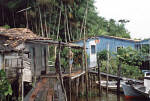Perhaps one of the first Europeans to visit the area was mercenary and adventurer Francisco de Orelana, who crossed the entire Amazon basin in search of a fabled golden city. Instead of gold he discovered a tribe of bare breasted women that he described as “the tribe of women alone”, the legendary Amazons after whom the forest is named. The thought of bare breasted women was enough to send me off on another adventure and perhaps, I thought, I could find some gold knocking around whilst I was there as well.
European naturalists who travelled to Brazil in the 18th and 19th centuries marvelled at the exuberance of the rainforest, which they saw as an empty paradise created by God without the intervention of man. Baron von Humboldt, one of the first European naturalists to visit the Amazon basin, wrote home to Germany in 1799: “What an extravagant country we are in. Amazing plants, electric eels, armadillos, monkeys, parrots….we have been running around like fools. For the first three days we could not settle on anything.”
Even Charles Darwin spoke of his “rapture” as he wandered by himself through the forest: “I collected a great number of brilliantly coloured flowers, enough to make a florist go mad….the air is deliciously cool and soft.”
The “empty” Amazon also attracted adventurers in search of El Dorado, like the ill-fated British colonel Percy Fawcett, who disappeared in 1925 while looking for a lost city, or, more recently, the thousands of wildcat prospectors who overran the Yanomami reserve in their frenzied hunt for gold.
The turn of the century rubber boom made fortunes for a few, but for 30,000 Indians used as slave labour it all too often meant death, although it was the technology they had developed which produced the latex.
One hundred years later, Asian logging companies have joined the Americans and the Europeans in stripping the forest of mahogany and other hardwoods, and researchers from major pharmaceutical companies, eager to find the ingredients for new miracle drugs in Amazon plants, target the knowledge of indigenous communities, where shamans are the repositories of centuries of plant knowledge. Strange stories began to percolate slowly into the press about stolen DNA, sacred sites being disturbed and the illegal selling of native blood. It read more like pulp fiction than hard news and tugged at my scientific curiosity.

In the heady mix of intrigue, empty rhetoric and outright lies that make up Brazilian politics, the Amazon region has become a topic of considerable lobbying power. Successive Brazilian governments have seen the rainforest’s unplanned exuberance as a challenge and tried to discipline it with roads and settlements, subsidising the burning of the forest to make way for cattle ranches; turning its giant rivers into waterways for huge grain barges: installing a free trade zone to swell the Amazon capital of Manaus with a sprawling circle of shantytowns, peopled by migrants from riverside villages.
While the G7 countries have put millions of pounds into Brazil to protect indigenous lands in the Amazon rainforest, inside Brazil a powerful lobby of mining and logging companies is seeking to overturn this protection. In congress, rightwing representatives are calling for the reduction of Indian reserves, while a senator from the Amazon state of Roraima has presented a bill to provide amnesty for goldminers who have committed crimes while “exercising their profession in indigenous or environmental conservation areas”. This would include the goldminers found guilty of genocide after murdering 18 Yanomami Indians. The rest of the world can only watch and shake their heads as vast tracts of forest disappear each year.
Unfortunately, the government of social democrat president Fernando Henrique Cardoso is so weakened by the recent financial crisis and the infamous Central Bank scandal that, in order to secure support from the rightwing “Amazon bloc” in congress, he seems prepared to renege on his commitment to demarcate and defend Indian lands.
It is not only the Brazilian right wing the indigenous people are up against. The UK rightwing think tank, IEA, has just published a booklet called The Myth of the Noble Eco-Savage, claiming that if left to their own devices, native peoples destroy the environment – while if collective land rights are replaced by private property, conservation thrives.
Read all five parts of Talkin’ About a Revolution
Part 1
Part 2
Part 3
Part 4
Part 5